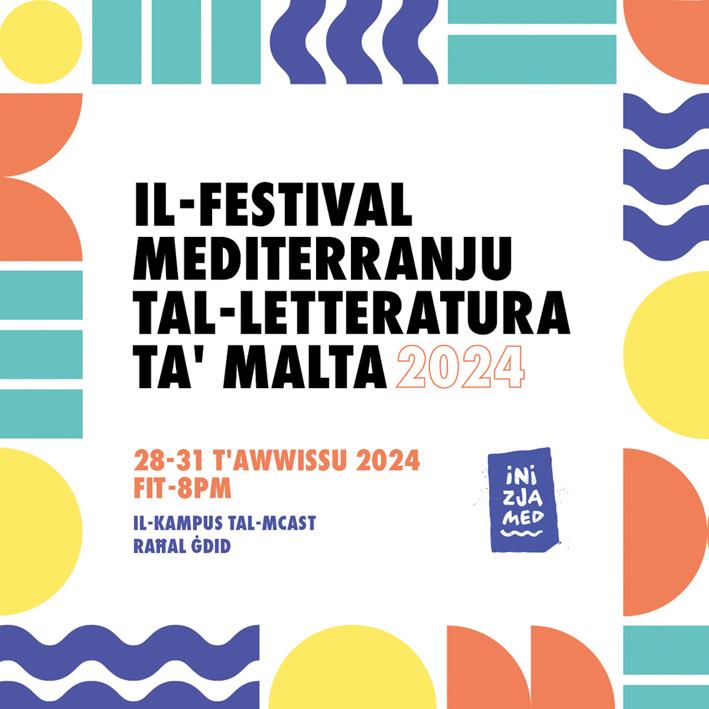Back in 2022, I read Irene Chias' novel Mur Ġibek (translated into Maltese by Mark Vella), a novel which explored the media's treatment of sexism, femicide and abuse in an innovative way. In 2023 Chias' latest novel, Fjura Tas-Sabbara was translated (also by Vella) and published. This interview aims to delve a bit deeper into that novel.
What is the inspiration behind 'Fjura Tas-Sabbara'?
The book was born from the awareness of a whole series of fixations and idiosyncrasies of the publishing industry, at least the Italian one, that I personally experienced with my second and third novels, Esercizi di sevizia e seduzione and Non cercare l'uomo capra. But this is just a starting point: other themes dear to me develop around this central topic. I believe the true protagonist of the novel is the psychological denial of catastrophes - climatic, environmental and humanitarian crises. The book addresses the irreversible environmental impact of human activities that seem so indispensable to us. These actions cause upheavals such as pandemics, climate change, refugee migrations and the contamination of aquifers and air. These crises have already led to the sacrifice of many populations and the extinction of numerous species, and they will continue to do so. This broader theme is mirrored, on a smaller scale, by the abandonment of small towns in southern Italy. The novel emerged from the sense of emptiness and generational decline felt by anyone visiting these once-thriving, now desolate towns.
Considering that it also discusses toxic masculinity in literature, would you say it's a continuation of your previous novel 'Mur Ġibek'?
I believe my books differ greatly from one another. However, the central themes are always those that are dear to me, hopefully enriched over time by study and personal growth. Of course, sexism - both the blatant kind and the type that turns to be almost invisible being so deeply ingrained in our culture - is one of these themes.
'Fjura' is also about language, especially the Sicilian dialect. Although translations help broaden our worldview, do you think something gets lost along the way?
Something inevitably gets always lost in every translation. However, sometimes, in certain languages, something can also be gained. Regarding the unique Italian-Sicilian relation, I think a Maltese translation could reflect this experience in the context of the English-Maltese language relation.
I notice you like to break the fourth wall a lot - what is the reason behind you addressing us readers directly?
I've never considered it before. It's likely a result of the political urgency in my writing, serving as a call for the reader to become aware and take action.
As this is a frequent theme in your novels, what is your view of gender equality in contemporary literature (at least from the books you've read)?
There is no gender equality anywhere, including in literature. In Italy, there is currently a controversy following an article by a male journalist that trivialises the success of female writers by categorising their work into three (rather offensive) groups. This has sparked many objections, but I believe it partially reflects how publishers themselves often perceive female writing. However, I remained silent, as I find the very idea of joining this polemic depressing. Leaving aside the specificity of Italy, even though I believe that literature goes beyond the gender of the author, I have recently found books written by women to be much more courageous and interesting than those by male authors, especially in addressing the atrocities that patriarchy and capitalism - always deeply intertwined in their worst forms - have led us to. I think of voices such as Olga Tokarczuk's, as well as books like Tender is the flesh by the Argentinean author Agustina Bazterrica, which I've just finished reading. I don't believe this is something inscribed in our DNA, of course. Instead, experiencing the world as women, as well as black people, migrants and other marginalised groups, gives us the chance to develop a more acute sensibility about certain subjects.
What are you currently reading and what's next writing wise (if you can tell us?)
I am currently reading Italian scholar Federica Timeto's essay Animali si diventa, a study exploring the intersection of anti-speciesism and feminism. The book recalls how animality is frequently invoked in conflicts involving oppressed groups, not just women, against the ideal model of a white, male, property-owning figure; how the suffragettes of the late 19th century were connected to the fight against vivisection; how black women's animalisation during slavery has left a significant legacy in our culture; how vegan individuals challenge traditional gender roles today. Concerning my future work as a writer, I have an idea and even a first draft, but I have decided to proceed very, very slowly. Perhaps the world as we know it will end before I complete this work.

The XVIVth edition of the Malta Mediterranean Literature Festival will feature seven authors from five different countries: Malika Booker - a British poet of Guyanese and Grenadian parentage, Irene Chias - an Italian novelist residing in Malta, David Aloisio from Malta, Mario Cardona, also from Malta, Raymond Antrobus from the United Kingdom, Josep Pedrals from Spain and Maja Ručević from Croatia. The festival, organised by Inizjamed, will be held between Wednesday 28 and Saturday 31 August. All events are going to be held at the Valletta Design Cluster and the MCAST Campus in Paola. Tickets for the final nights can be purchased from ShowsHappening.com.
For more information log onto Facebook, Instagram and Inizjamed's website www.inizjamed.org